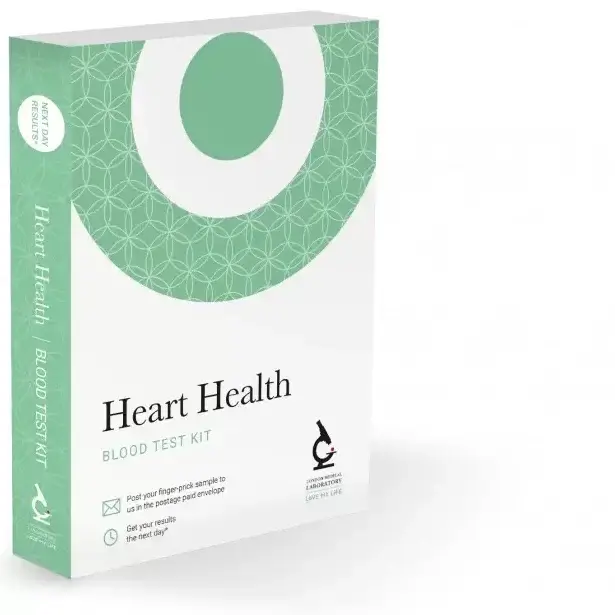
Heart Health test for a positive lifestyle
Dears Pharmacy are working in partnership with London Medical Laboratory to deliver this test.
Price per in pharmacy test provided during booking prior to confirmation.
Introduction
Monitor your heart health with a combination of essential tests for cholesterol, diabetes and inflammation.
Early diagnosis and regular monitoring can help you make the positive lifestyle and dietary changes needed to improve your chances of a long and healthy life.
How does this test work?
There is no better way to check for underlying health problems, or monitor existing conditions, than with a blood test.
Whether you are concerned about your health, managing an existing condition or simply curious, a blood test provides a fast, affordable and easy way to start taking charge of your own health.
We offer in-store testing to make the process as simple, stress free and convenient as possible.
You will receive your results in around 5 to 7 days.
*It is important to note that blood tests alone are not a substitute for seeing a doctor, particularly if you have any symptoms. You should not make a diagnosis or start any treatment without a consultation with a doctor or suitably trained healthcare professional.


What do you test?
Cholesterol (6 Biomarkers)
High cholesterol levels can cause your arteries to become blocked – leading to coronary heart disease, heart attack or stroke. Finding out about high levels of cholesterol can help you to make the positive lifestyle and dietary changes needed to improve your chances of a long and healthy life.
Total cholesterol
Total Cholesterol is a measurement of the total amount of cholesterol in the blood, this includes low-density and high-density lipoprotein cholesterols. It is used to produce hormones for development, growth and reproduction. Total cholesterol tests are used to estimate the risk of developing heart disease.
High density lipoprotein
High Density Lipoprotein (HDL) is a form of cholesterol which is classified as the ‘good’ cholesterol. Its main function is to help remove cholesterol from the heart’s arteries. HDL tests are used to estimate the risk of developing heart disease.
Low density lipoprotein
Low Density Lipoprotein (LDL) is classified as the ‘bad’ cholesterol, this is causes cholesterol build-up and blockage in the arteries. LDL tests are used to estimate the risk of developing heart disease.
Total cholesterol: HDL Ratio
Total Cholesterol: HDL Ratio is a calculation which indicates the amount of ‘good’ cholesterol there are in terms of the total cholesterol in the body. HDL helps to remove cholesterol from the heart’s arteries. Total cholesterol: HDL ratio test is used to estimate the risk of developing heart disease.
Non-HDL cholesterol
Non-HDL Cholesterol is the number of total cholesterols without the high-density lipoprotein (HDL), the ‘good’ cholesterol. NON-HDL cholesterol tests are used to investigate the lipid profile during the estimation the risk of developing heart disease.
Triglyceride
Triglyceride is a type of fat stored in the body’s tissues and can derive from foods such as butter and oil. Triglyceride tests are used to investigate the lipid profile during the estimation the risk of developing heart disease.
Diabetes (1 Biomarkers)
Checking your levels of HbA1c is how to confirm if you have (or are at risk of developing) diabetes. Unmanaged or undiagnosed diabetes is one of the leading causes of mortality. For anyone who already knows they have diabetes, regular HbA1c checks are essential to monitor progress.
Haemoglobin A1C
Haemoglobin A1c (HbA1c) test is used to measure the average level of blood sugar over the past two to three months and is commonly used to diagnose and monitor diabetes. The sugar is called glucose which builds up in the blood and binds to the haemoglobins in the red blood cells. HbA1c test will then measure how much glucose is bound and is used during the diagnoses of diabetes.
Inflammation (1 Biomarkers)
Inflammation is a process by which your body’s white blood cells protect you from infection from external bacteria and viruses. Checking for inflammation can help diagnose a wide range of conditions.
High sensitivity C-Reactive Protein
High Sensitivity C-Reactive Protein (hs-CRP) is a test which measures the lower levels of CRP. CRP is a protein which increases in the blood during inflammation. hs-CRP tests are used predict the risk of heart conditions such as a heart attack.
FAQs
What are the different types of cholesterol?
There are 2 types of cholesterol. Good and bad Cholesterol, Good is also called HDL cholesterol and bad is LDL and non HDL cholesterol . This together makes up your TOTAL cholesterol level.
What should my levels be?
Your Total cholesterol level should be 5 or below, HDL 1 or above, LDL 3 or below and NON HDL 4 or below ideally.
What can I do to make sure these levels are in check?
Cutting down on fatty food especially foods which contain saturated fat. Exercise more and stopping smoking whilst reducing alcohol intake can reduce cholesterol levels.



